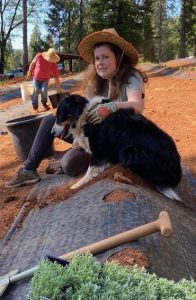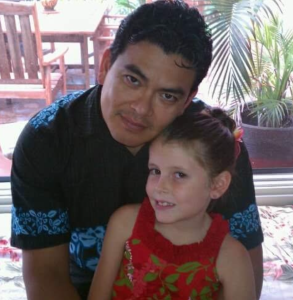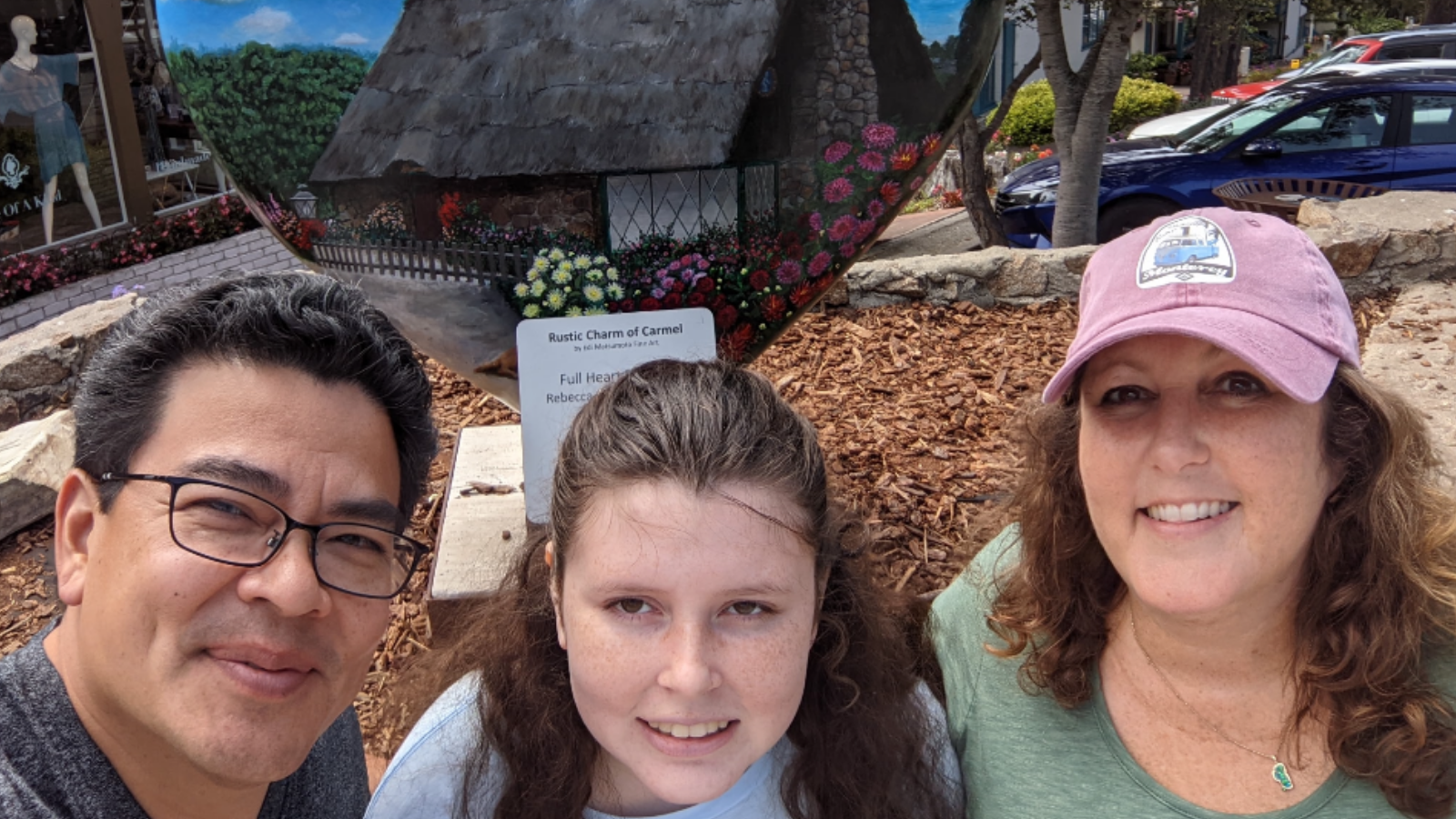Left to right: Rico, Cayla and Carrie Casco in front of heart statue in Carmel, Calif.
Born in Hawaii 22 years ago, Cayla finds peace in water. It’s one of the only places the voices don’t follow her. Now living in Northern California, she’s still drawn to calming places like Carmel and Lake Tahoe.

Young Cayla in the ocean with a dolphin.
For the first 13 years of her life, Cayla was a straight-A student who dreamed of becoming an architect. But after puberty, she began experiencing depression, anxiety and eventually, severe panic attacks and hallucinations. School and time with friends — once the highlight of her day — suddenly became overwhelming. Midway through freshman year, Cayla’s mom, Carrie — a former orthopedic technician on a hospital trauma team and later a special education teacher — began homeschooling her daughter to ease the growing anxiety.
At 15, Cayla spent an entire night awake seeing flashing blue lights, hearing voices and feeling like her head might explode. Both with healthcare backgrounds, her parents recognized this was more than anxiety or depression and took her to the emergency department the following morning. Once there, Cayla was placed on a 5150 hold, an involuntary, temporary psychiatric commitment for individuals who may pose a danger to themselves or others. Two days later, she was transferred to the Sutter Center for Psychiatry.

Cayla and Bailey on the lavender farm.
While in treatment, Cayla learned how to recognize emotions, check her senses and practice healthy coping strategies like puzzles and card games. Amid fear and confusion, she found comfort in her care team. “The nurses made me feel safe,” Cayla said. “The doctors were also kind. I called one ‘Wonder Woman’ because she looks like her and saves people.” After her inpatient stay, Cayla enrolled in a program specializing in teens with schizophrenia.
Today, she lives with her parents, helps tend the family’s lavender farm, works on puzzles over 1,000 pieces, and spends cherished time with her dog Bailey, who sleeps beside her each night and helps manage her anxiety.
While a few years ago Cayla couldn’t be in public or care for herself, these days she manages daily tasks on her own. She helps around the house, looks after her nieces and nephews, and continues counseling to support her mental health. She’s also learning to cook (spaghetti is her favorite) and earning straight A’s in her AutoCAD certification program. She once again hosts friends for movie nights and sleepovers — something she deeply missed before treatment.
“When patients like Cayla share their experiences, they help reduce stigma, encourage others to seek care and strengthen how we support those living with serious mental health challenges,” said Dr. Matt White, chair of Sutter Health’s Behavioral Health Service Line. “Her voice doesn’t just raise awareness — it drives meaningful progress in how we talk about, understand and treat these conditions.”
For others struggling and unsure about getting help, Cayla shares this advice: “Getting help doesn’t mean you’re weak — it means you’re choosing to fight for yourself. Even when it’s scary or doesn’t work right away, it’s worth continuing to try. There will be ups and downs, but you learn to catch yourself sooner. I know I’m strong today and able to enjoy things I loved before because I chose to seek care and stick with it.”
Learn more about mental health support services at Sutter Health.
Family at the Heart of Healing
For Cayla, her parents’ unwavering support is what helped her most. After she returned home, Rico took a two-month leave from work as an imaging supervisor, and Carrie left her job to care for Cayla full time.

Rico and young Cayla.
“Nothing prepared me for seeing my daughter in that kind of pain and declining so rapidly,” said Carrie. “I felt helpless and couldn’t just step in and fix it. But I knew I had to be there to help her stay active [and] follow her care plan.”
Rico said while he’s proud every day of how far Cayla has come, what inspires him most is her heart. “Even with everything she’s faced and still faces, Cayla is always thinking about helping others — her family, her friends, even strangers,” he said. “She is incredibly selfless despite her struggles, and that’s what makes me most proud as her dad.”
There’s no roadmap for navigating a mental health crisis. But for families facing similar challenges, Carrie and Rico offer three key takeaways:
• Take care of yourselves, too. Early on, they realized they’d lost themselves in caregiving. Now, both see counselors and prioritize self-care and communication. “You can’t help your child if you’re completely depleted,” Rico said.
• Stick with it. Treatment takes time. Cayla has tried several medication regimens. Her current one is working, but they know it may need adjusting over time. “We never imagined she’d get back to where she is today,” Carrie said. “But the right fit was out there — we just had to trust the process and keep going.”
• Lean on your community. Their church supported them emotionally and financially, even helping cover Cayla’s early therapy costs not covered by insurance. “I know in my soul my daughter is fearfully and wonderfully made by God,” Rico said. “I believe she’ll be healed. We are given nothing in life we can’t handle — even when it feels like it.”
NOTE: This content is not intended to be a substitute for professional medical advice, diagnosis or treatment. Always seek the advice of your physician or other qualified health provider with any questions you may have regarding a medical condition. Never disregard professional medical advice or delay in seeking it because of something you have read on this website.





